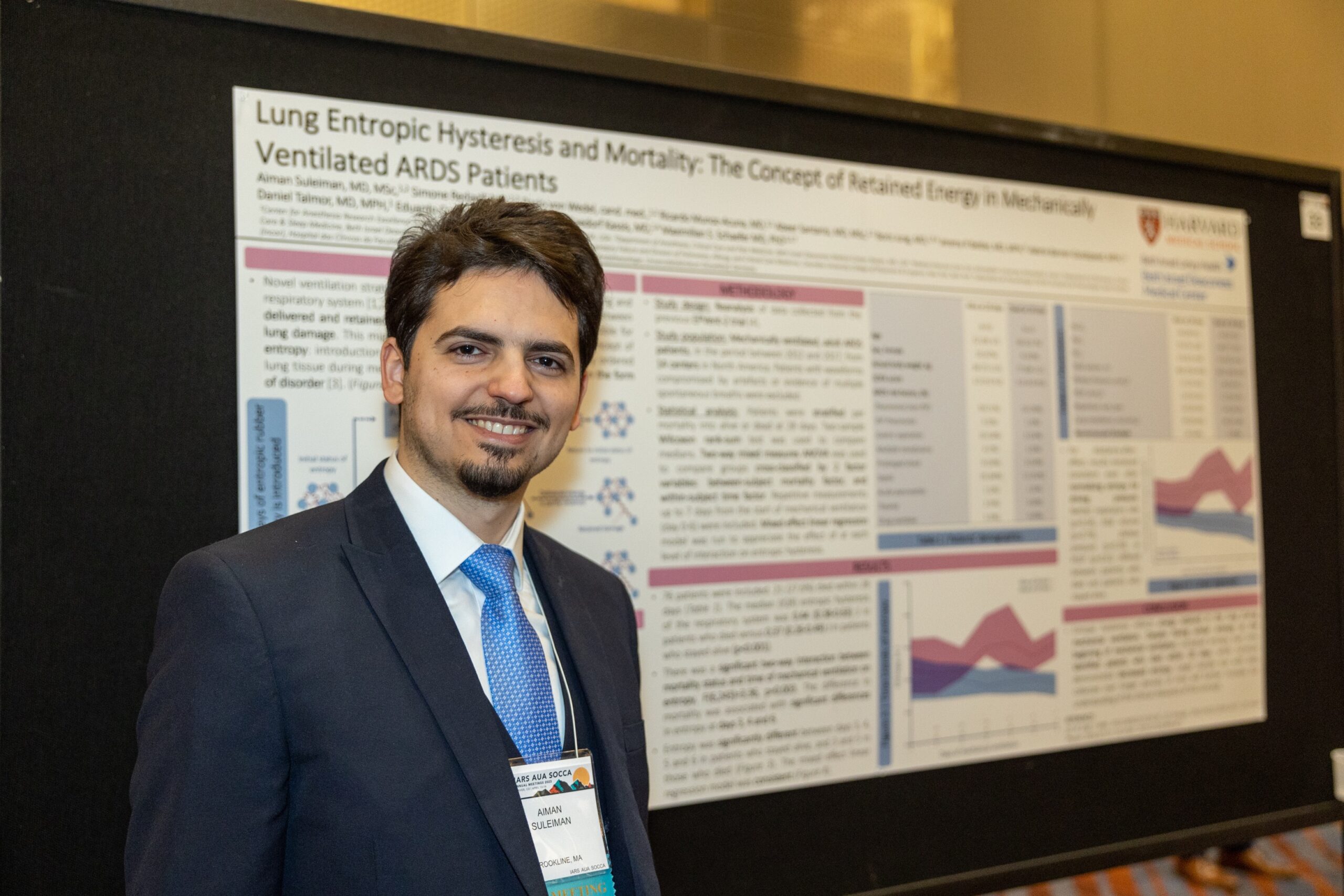New Strategies for Improving the Value and Quality of Life for ARDS Patients
An Interview with 2023 Kosaka Best Abstract Award Recipient in Clinical Research – Dr. Aiman Suleiman
 Aiman Suleiman, MD, MSc, SPC
Aiman Suleiman, MD, MSc, SPC
Senior Research Fellow in Anaesthesia
Perioperative Outcomes Lab of the Center for Anesthesia Research Excellence
Beth Israel Deaconess Medical Center
Boston, MA
Abstract Title:
Lung Entropic Hysteresis: The Concept of Retained Energy in Mechanically Ventilated ARDS Patients
Possessing a passion for classical and theoretical physics, Aiman Suleiman, MD, MSc, SPC, is fascinated with the anesthesiology specialty and the opportunity it provides to apply principals of physics to medicine. Through his research on lung-protective ventilation, mechanical power and entropy, he has been fortunate enough to be able to explore the intricate and dynamic relationships between energy and the respiratory system and how these factors can impact patient outcomes. A Senior Research Fellow in Anaesthesia in the Perioperative Outcomes Lab of the Center for Anesthesia Research Excellence at Beth Israel Deaconess Medical Center, his most recent research, “Lung Entropic Hysteresis: The Concept of Retained Energy in Mechanically Ventilated ARDS Patients” was recognized with the 2023 Kosaka Best Abstract Award in Clinical Research at the IARS 2023 Annual Meeting. With this investigation, he hopes to improve the value and quality of life for patients with acute respiratory distress syndrome (ARDS) through identifying new strategies for reducing the risk of mortality and other complications associated with mechanical ventilation and optimizing the delivery of respiratory support during surgery and critical care. In this interview, he delves into what drew him to the specialty and how he hopes this work will impact future patient care.
1. For this research, you are:
Principal Investigator
2. What drew you to the anesthesiology specialty?
One essential aspect of our specialty is to avoid or alleviate pain, which I consider to be one of the most noble and compassionate acts a human being can perform. As someone with a passion for classical and theoretical physics, I find anesthesiology to be a fascinating field that presents a unique opportunity to apply the principles of physics to medicine. Through my research on lung-protective ventilation, mechanical power, and entropy, I have been able to explore the intricate and dynamic relationships between energy and the respiratory system, and how these factors can impact patient outcomes.
3. What drew you to this area of research?
My deep curiosity about theoretical and practical mechanisms, as well as a commitment to improving patient care through evidence-based practices.
4. What are the goals you most want to accomplish in your work with this research project (or projects)?
The goal of my work is to improve the value and quality of life for ARDS patients through identifying new strategies for reducing the risk of mortality and other complications associated with mechanical ventilation, and to improve patient outcomes by optimizing the delivery of respiratory support during surgery and critical care.
5. What is the potential impact of your research on the field of anesthesia and patient care?
I think it can have a significant impact. By better understanding the relationships between energy, mechanics, and the physiology of the respiratory system, we can develop more effective and targeted interventions for lung-protective ventilation and other aspects of anesthetic care. This can help to reduce the risk of adverse events, improve patient outcomes, and enhance the overall quality of care.
6. What are the benefits of presenting your research during poster sessions at the IARS Annual Meeting?
It is a great opportunity to share findings with other researchers, esteemed clinicians, and other stakeholders in the field of anesthesia. It also allows me to receive feedback and engage in discussions with others who share my interest in this area of research, which can help to further refine and improve my work.
7. How do you feel about receiving the Kosaka Best of Meeting Award?
It was a tremendous honor and a great reward for the hard work and dedication we as a team have put into this project. It also inspired us to continue to push the boundaries of what is possible in this area of study.
8. How will this award affect your research and professional trajectory?
I think it will help to raise the visibility, awareness and impact of our work on lung-protective ventilation and other aspects of anesthetic care. It will also be a reference that I can build on to further advance my research.
9. Is there anyone else you wish to acknowledge as part of this research team?
I would like to acknowledge the contributions of my mentor Dr. Maximilian Schaefer and my wonderful colleagues at the Perioperative Outcomes Lab of the Center for Anesthesia Research Excellence at BIDMC and Harvard Medical School, who helped design and carry out this research project. This would not have been a success without them.
10. Outside of your research, what might someone be surprised to learn about you?
I am a professional artist, chess player, poet and book writer. These aspects of my life help to balance out the rigorous and demanding nature of my work. They also help me to develop my own perspectives and make meaningful contributions to science.
“It is a great opportunity to share findings with other researchers, esteemed clinicians, and other stakeholders in the field of anesthesia. It also allows me to receive feedback and engage in discussions with others who share my interest in this area of research, which can help to further refine and improve my work.”
– Aiman Suleiman, MD, MSc, SPC, 2023 Kosaka Best Abstract Award Recipient in Clinical Research
International Anesthesia Research Society
